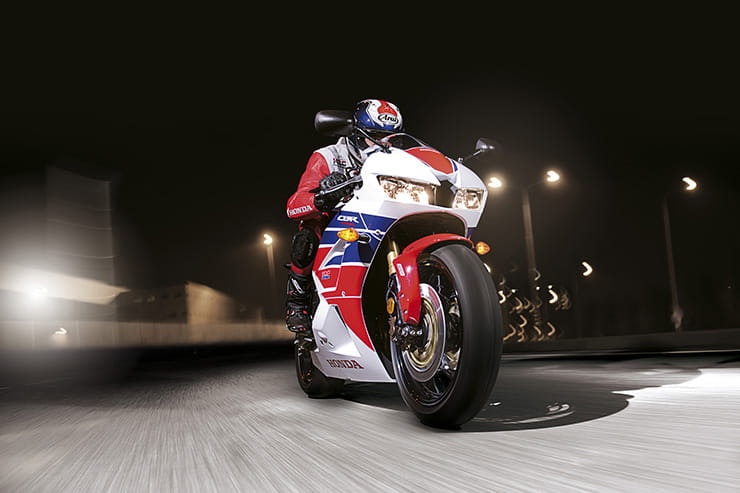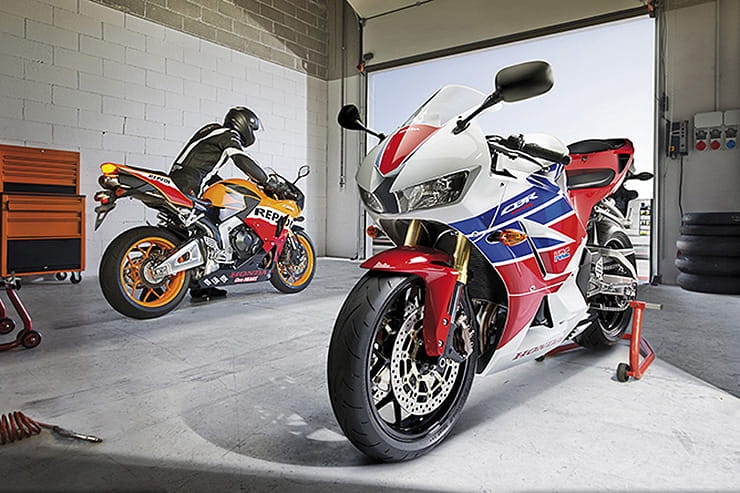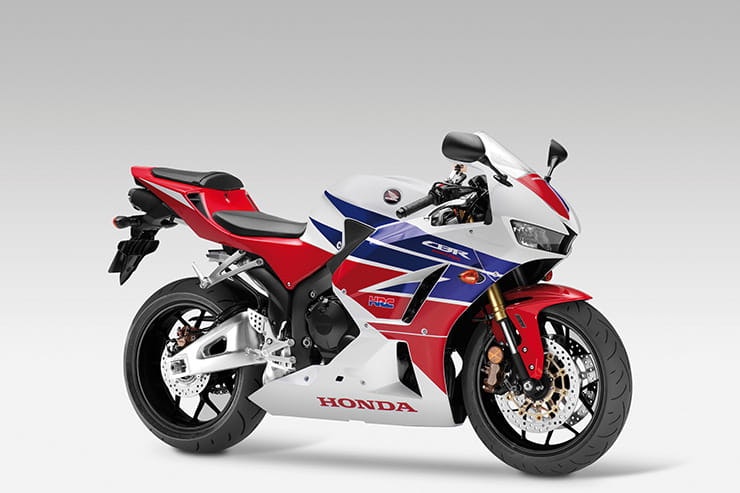Honda CBR600RR (2013-2017): Review & Buying Guide
By Jon Urry
Massively experienced road tester
16.08.2021
Since its launch in 2003, the Honda CBR600RR has been a huge success, not only in terms of showroom sales but also track victories. Indeed, it took six straight World Supersport titles from 2003 until 2008 and then followed that up with two more later in the 2010s. However, all good things must come to an end and in 2017 the CBR600RR was discontinued, forced into retirement through emission regulations and the collapse of the supersport segment. Which it has to be said, was due to the CBR (and its rivals) getting too complicated, too track focused and too expensive as a result. So why not treat yourself to the final generation (the new model isn’t destined to make it to the UK – yet...) of Honda’s stunning supersport bike, the 2013-onwards CBR600RR. If you like your bikes small, precise and beautifully engineered, they don’t get much better...
Honda CBR600RR (2013 – 2017) Price
Bad news for used bike buyers, the supersport market is red hot at the moment and the CBR600RR is very sought after which means prices are high. Brand new it cost £9500 but a 2013 model will still set you back £6500 for a reasonable one in a private sale or £7300 for a nice one from a dealer. If you want the last year (2017) then you are talking £8000 for a used one with pre-registered ‘brand new’ 1-mile bikes going for £8999! Ouch!
Power and torque
The RR’s motor is a mixed bag. On the road there is no denying it is a bit rev-happy and requires fairly furious work of the gearbox to keep it on the boil due to a lack of mid-range. If this doesn’t bother you then it’s a real beauty, however if it does it can be annoying. On track this extreme nature makes it incredibly good fun to ride and there is nothing more satisfying burying the needle up in the rev range and hearing that inline four sing...
Engine, gearbox and exhaust
In 2007 Honda completely revised their RR’s motor in an effort to squeeze a bit more midrange out of it to appease road riders. This was the last time the engine was significantly changed before the model was discontinued and despite the fact the 2013 version was claimed by Honda to have improved performance, it basically boils down to a few tweaks to the ECU and a slightly different airbox, so is nothing to write home about. Did it need updating? Not really because when you are talking a 599cc inline four, claimed power figures of 118bhp (88kW) and 48.7 lb-ft (66Nm) of torque are incredibly impressive. More so when you take into account the RR’s reliability. In terms of the engine’s mechanics, the RR is basically bulletproof. On the road it is very hard to ever stress it and even track use doesn’t worry it too much as long as you change its oil regularly. Yes, you get the occasional regulator failure or generator going down but that’s about it and you will be very unlucky indeed if you buy a lemon. The main issue on used bikes is electrical gremlins which are generally items such as the crank sensor, airbox sensor or gear sensor failing, all of which are irritatingly expensive to buy new to replace – even more so the electronic steering damper. There are plenty of pattern alternative as well as used items for sale, but these can vary in their quality and reliability. When buying used concentrate your search on a bike with a good service history and all should be well, just be cautious about any machines approaching the 16,000-mile mark as that’s the valve-clearance check and it a heck of a task to complete (and therefore expensive) due to the compact nature of the bike. When it comes to the gearbox and exhaust system, again all is solid and the only issues tend to be from neglect or badly fitted extras. The exhaust valve can stick shut, which throws up a warning code on the dash, but the OE system is unlikely to be rusty or holed. Some owners bypass the valve through a link pipe, which does reduce the heat emitted onto your leg, and isn’t a bad idea. It can be done with either the OE can or an aftermarket one but you may need to fit an electrical device to fool the ECU into thinking the valve is still there or get the ECU remapped and the error code removed.
Honda CBR600RR (2013 – 2017) Economy
The CBR is a sportsbike and so you are looking at 33mpg if ridden with moderate enthusiasm on the road, although some owners claim to reach near 40mpg. On track this figure plummets as the screaming engine guzzles the good stuff at an alarming rate. But it is really good fun, so you won’t mind too much...
Handling, suspension, chassis and weight
The chassis is actually the one area that the 2013 RR received some significant updates – although only in certain areas. The frame and swingarm were untouched but due (according to Honda, fashion may well have played a part...) to the advancement in tyre technology Honda decided to fit uprated Showa Big Piston forks, which are better able to deal with the stresses of track use while also delivering a more comfortable road ride. The shock’s settings were also improved and new 12-spoke wheels fitted, which look great but aren’t significantly lighter than the older design. Did it need significant changes? Not really and to prove the point, seven years after the RR’s chassis was last upgraded it took a WSS title. And when you ride an RR you instantly feel all its racing DNA.
Small, compact and super-agile to turn, the RR is an absolute weapon on track. The front end is incredibly assured in bends and with a set of sticky tyres fitted you can throw it at an apex and lean until your heart’s content. It really is amazing. On the right road, which has to be fairly smooth, it is also a joy but thrown in a few bump and the low bars, high pegs and unforgiving riding position will soon take its toll. This is a bike for small riders to enjoy at speed, not bigger ones to bimble around on...
When it comes to buying used, watch out for the obvious crash damage but also inspect the bearings well as wheel bearings do wear quite quickly and headstock bearings may need changing now. Like the engine, little goes wrong with the chassis so you are looking for wear and tear on items such as the radiator (stone damage, leaks etc), chain and sprockets, brake pads and tyres.
Honda CBR600RR (2013 – 2017) Brakes
Honda were the first to introduce Combined ABS to the sportsbike world way back in 2008 (on the Fireblade) and although it is a decent system it is pretty much limited to road and not track use, despite what they claim. The system works through pressure sensors, which feed back brake pressure to an ECU which then assesses front and rear wheel speeds and alters the brake balance to keep the bike flat and level. Cleverly, although linked, only hard rear brake pressure activates the front, gentle pressure keeps it independent. On the road the system is effective and works well, and the same can be said of a damp track, but on a dry track it can get a bit flustered and is better off being disabled (there is no option to turn it off). When buying used be aware bleeding the brakes is a nightmare that takes about four hours, so check when it was last done and ensure the brake fluid is nice and clear. Also, be aware that fitting braided lines is extremely convoluted as well, so if the brakes are a bit crap you need to factor in quite a hefty bill to sort them out. That’s assuming the pump is working well, if the actual ABS unit is damaged the high price of a replacement means you are better off simply removing it and going back to analogue stoppers!!!
Comfort over distance and touring
The CBR is designed for the track and while some will take it on weekend trips away, it isn’t a very pleasant experience. Small, compact and rev-happy, what makes it superb on the circuit makes it terrible for touring. Fitting a double bubble screen helps matters sightly but really you know what you are getting into when you buy one. Save it for what it was made to be good at rather than forcing it to fulfil a job that was never in its remit.
Rider aids and extra equipment / accessories
Aside from C-ABS, the CBR has no rider assists. It was built before the likes of the Kawasaki ZX-6R added traction control to supersport bikes and to be honest, it doesn’t require such a system. When it comes to accessories race end cans are common, as is crash protection, rear sets, a taller screen and tail tidies. Be wary of non-standard fairing kits as they not only don’t fit very well, they mean the bike has probably been crashed. You can play with the final gearing to give it a bit more guts, which isn’t a bad idea, and alarms are also common, which can be a pain as they often tend to develop issues with age. Be wary of quickshifters as on the road they can damage the gearbox and the same goes for any other electrical items other than a simple plug-and-play gear indicator or fuelling module, both of which are simple to remove. In general, CBR owners tend to stick with basic upgrades, which is no bad thing at all. Remember, if you do want to take it on track (and it loves to be ridden here) you will need an exhaust that meets track noise limits, so always see if the OE can is included in the sale or if the aftermarket item has a removable baffle or is road legal.
Honda CBR600RR (2013 – 2017) verdict
The Honda CBR600RR is an acquired taste and will only appeal to certain riders. If you are after a full-on supersport bike that is stunning on tack and just loves to rev, the RR will certainly keep your adrenalin flowing. On the road, however, it is still a bit gutless and the riding position is cramped, quickly making it a bit tiresome. That said, the build quality is excellent, reliability unquestioned and it does look really cool – especially in Repsol colours.
Three things we love about the CBR6-RR
Thrilling rev-happy engine
Cool looks
Build quality
Three things that we don’t…
Lack of mid-range
Very uncomfortable riding position
Still pricey in the used market
Honda CBR600RR (2013 – 2017) spec
Looking for motorcycle insurance? Get a quote for this motorbike with Bennetts bike insurance


